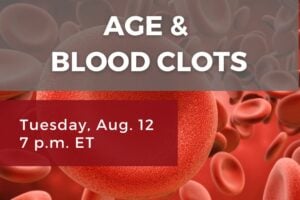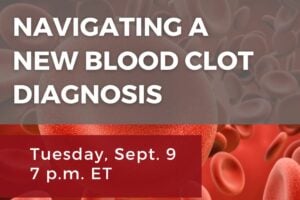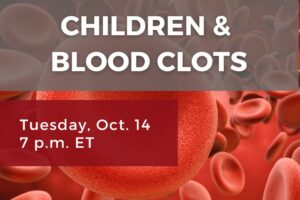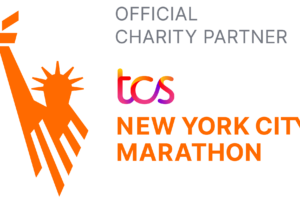By: Stephan Moll and David Manly, Chapel Hill, NC (Dec 31st, 2008)
Hello, and welcome to this special podcast report on the proceedings of the 2008 American Society of Hematology annual meeting. This is David Manly from Chapel Hill, North Carolina, reporting. The ASH annual meeting, which celebrated its 50th anniversary this year, features the latest developments in hematology research and clinical care. This podcast will review several interesting studies presented at ASH from five distinct areas of thrombosis and thrombophilia. We will discuss the link between blood clots and cancer, duration of treatment with anticoagulants, blood clotting disorders, warfarin management and the prospect of new anticoagulants. The references to the studies discussed can be found in the transcript of this recording at stoptheclot.org.
To begin, a major clinical study (ref. # 1) was presented at ASH describing the use of anticoagulant therapy in cancer patients without known blood clots. The study showed that cancer patients without a known blood clot who were receiving anticoagulation had a two-fold lower risk of developing a blood clot. Patients with lung cancer, a subset of cancer that has a particularly high risk for developing clots, benefited the most from protective anticoagulation. This is an important study because approximately 20% of all venous blood clots are associated with cancer and this study showed the effectiveness of anticoagulation to protect against blood clots in cancer patients. Conversely, a second study showed that patients with an unprovoked blood clot, meaning there is no definitive cause for the clot, may have an undiagnosed cancer as the root cause of clotting. This introduces the notion that patients with unprovoked blood clots should be examined thoroughly for cancer. However, it is not known whether this earlier detection translates into survival benefit, improved quality of life or cost savings.
A special education session (ref. # 2) was presented at ASH to discuss how long patients who have had a blood clot should be treated with anticoagulants. This presentation was mostly a summation of the new American College of Chest Physicians (ACCP) guidelines that were published in June 2008 (see September 2008 podcast update). For blood clots associated with known, short-term risk factors such as major trauma or surgery, anticoagulation for 3 months after the event is advised. For a blood clot that occurs for an unknown reason the ACCP guidelines recommend at least 3 months of anticoagulation, with consideration of long-term anticoagulation. Also, by ACCP guidelines, presence or absence of an inherited thrombophilia does not significantly alter this recommendation.
Controversy exists as to which patients and family members of patients with blood clots should be tested for thrombophilia, an inherited clotting disorder (See September 2008 podcast update). No significant data was presented at ASH to define a clear guideline for who and when to test for clotting disorders. One study (ref. # 3) of thrombophilic families showed that deficiency in protein C and S are risk factors for arterial blood clots in patients less than 55 years of age. After the age of 55 conventional risk factors for heart attack and stroke (ex: smoking, hypertension, cholesterol) reduce the significance of thrombophilia in developing a blood clot. Thus, this study makes the case that patients less than 55 who have an arterial blood clot should be tested for protein C and S deficiency. A presentation at ASH (ref #4) reviewed genetic testing for appropriate warfarin dosage. Certain genetic markers have been identified that predict higher or lower warfarin maintenance doses. However, it has not yet been shown in clinical studies that such testing leads to less bleeding and less clotting complications. Therefore, genetic testing for warfarin dosage is not yet ready for routine clinical use.
Several studies presented at ASH focused on new anticoagulants. For years warfarin has been the only oral anticoagulant in clinical use with approximately 3 million people in the U.S. receiving warfarin to protect against blood clots. New oral anticoagulants have been the focus of much research over the last decade; however, drug development is not a trivial matter. Four years ago a promising oral anticoagulant, Ximelagatran, failed to receive FDA approval due to liver toxicity. Two new oral anticoagulants, Dabigatran and Rivaroxaban, are now available in Europe and Canada for blood clot prevention after orthopedic surgery. However, they are not approved at this point for use in the U.S. Large clinical trial testing is ongoing and the clinical arena of anticoagulant therapy will likely change significantly over the next 5 years.Rivaroxaban is a new oral Factor-Xa inhibitor used for blood clot prevention after major orthopedic surgery, specifically total hip and total knee replacement. Factor-Xa is a blood protein that plays an essential role in clotting. Factor-Xa inhibitors, such as Rivaroxaban, prevent clotting by blocking the action of Factor-Xa during blood clot formation. A study presented at ASH (ref #5) showed that Rivaroxaban was more effective than Enoxaparin, which is low molecular weight heparin (the gold standard for anticoagulation), in protecting against venous blood clots with a similar rate of major bleeding. The effectiveness of this drug has led to its approval in Europe and Canada. This is an extremely promising anticoagulant and an FDA decision about approval in the U.S. is pending and expected in 2009.
Apixaban is another oral Factor-Xa inhibitor that was tested for blood clot prevention after major orthopedic surgery and again compared to Enoxaparin (ref # 6). A similar incidence of clotting was found between the two drugs, and Apixaban had a lower occurrence of bleeding. However, a lower-than-expected rate of clotting in both groups reduced the significance of the study. At this point, apixaban is not approved in Europe, Canada or the US, and clinical trials with a different design will need to be performed.
Dabigatran is an oral synthetic specific thrombin inhibitor. It is approved in Europe and Canada for the prevention of clotting after major orthopedic surgery. No new data on Dabigatran were presented at this meeting. Dabigatran, rivaroxaban and apixaban, are the 3 oral anticoagulants furthest ahead in clinical development.
The ability to reverse the new oral anticoagulants (rivoraxaban, apixaban, dabigatran) in case major bleeding occurs is important for the safe use of these new drugs. While warfarin can be reversed with vitamin K, prothrombin complex concentrates and, to some degree, with fresh frozen plasma, the new oral anticoagulants do not yet have any antidotes or reversal agents. This could potentially be a major problem as major bleeds on these drugs are expected to occur once they become widely used. One study presented at ASH (ref #7) reported on a newly developed antidote against factor-Xa inhibitor anticoagulants. The drug is an inactivated form of human factor X . The recombinant factor X is chemically modified, so that it binds to and neutralizes the action of the factor-Xa inhibitor oral anticoagulants (rivoraxaban, apixaban, dabigatran). A person’s own factor X is then fully active again, and is available to help stop the bleed. Although it is promising news for the safety of the new oral factor-Xa inhibitor anticoagulants, there is worry that because the reversal agent is a modified human protein , a person’s immune system might respond against it. Another study presented at ASH (ref #8) reported that fourteen baboons treated with high doses of rivaroxaban and given either prothrombin complex concentrate or recombinant factor VIIa (treatments also used for hemophilia patients) recovered from the potential for a major bleed. These two drugs may be potential antidotes during bleeding emergencies of rivaroxaban treated patients.
Thank you for listening to this special podcast report presented by the National Blood Clot Alliance. We hope you join NBCA in the effort to raise awareness, educate and protect the American people against venous blood clots. And remember, patient advocacy and education is our top priority, so please inform us of any suggestions you may have to help make this podcast more educational. You can send your suggestions to NBCApodcast@gmail.com. That is spelled N-A-T-T-P-O-D-C-A-S-T@G-M-A-I-L.com. There is still much to do and NBCA greatly needs your support.
Posted January 14, 2009
References:
1. Agnelli G et al. Abstract # 6. Blood 2008 ;112(11):5.
2. Bounameaux H. ASH Education Program Book, pages 252-258.
3. Mahmoodi BK et al. Abstract # 422. Blood 2008 ;112(11) :161.
4. Francis CW. ASH Education Program Book, pages 259-265.
5. Turpie AGG et al. Abstract # 36. Blood 2008 ;112(11):19.
6. Lassen MR et al. Abstract # 31. Blood 2008 ;112(11):17.
7. Lu G et al. Abstract # 983. Blood 2008 ;112(11):362.
8. Gruber A et al. Abstract # 3825. Blood 2008 ;112(11):1307
Click here to return to our news page.







